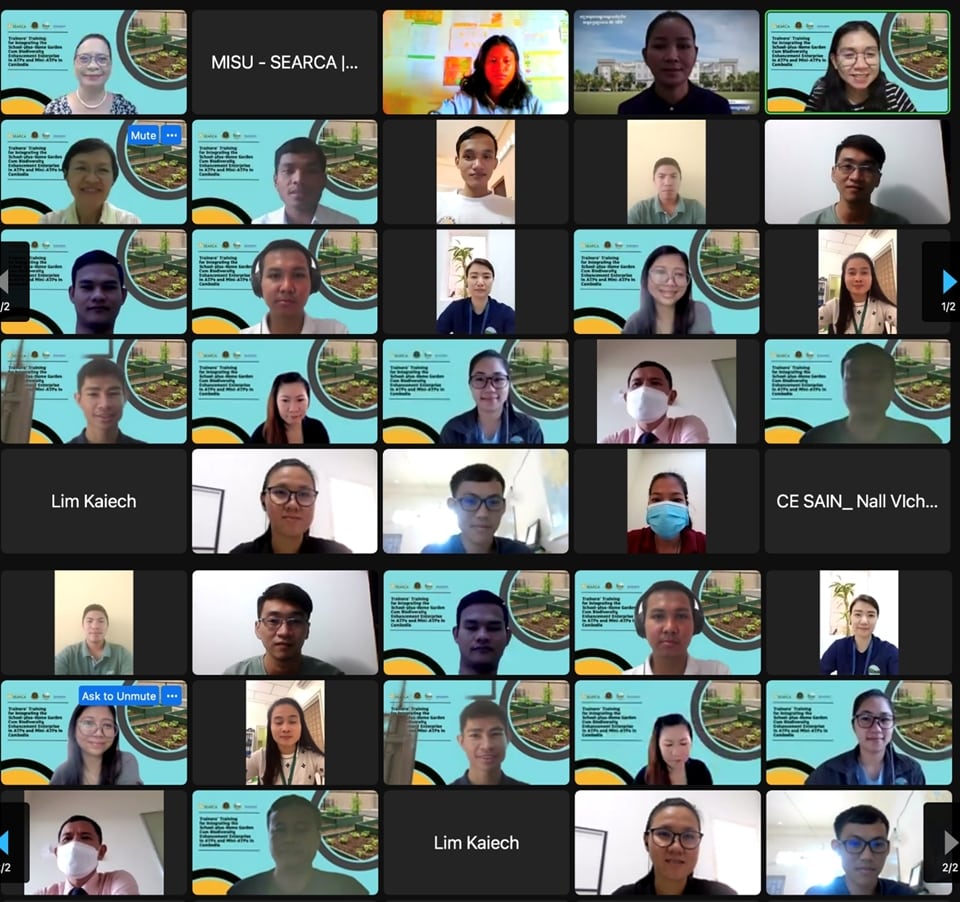With the goal of boosting the capacity of teachers and local government offices of the target schools for the Agricultural Technology Parks (ATPs) and mini-ATPs in Cambodia, the e-training titled, Trainers’ Training for Integrating the School-plus-Home Gardens cum Biodiversity Enhancement Enterprise (SHGBEE) in ATPs and Mini-ATPs in Cambodia conducted its 6th session on 26 January, via the Zoom platform. This is an ongoing online training program jointly organized and implemented by the Southeast Asian Regional Center for Graduate Study and Research in Agriculture (SEARCA) and the Center of Excellence on Sustainable Agricultural Intensification and Nutrition (CE SAIN), in partnership with the Kansas State University (KSU) and the University of the Philippines Los Banos (UPLB).
 Participants and organizers of Session 6.
Participants and organizers of Session 6.
The session was led by Dr. Blesilda M. Calub, University Researcher IV from the Agricultural Systems Institute, UPLB. She tackled the topic, Organic Agriculture for School Gardens. She shared insights on the rationale, policies and institutions, principles, and practices on organic agriculture and basic information on organic soil amendments and the importance of healthy soils for school gardens to be sustainable and have an all year round supply of vegetables. She also emphasized on the benefits of shifting to organic agriculture. She said that organic agriculture could ease concerns on human health, environment, and could be a source of income and livelihood. The importance of promoting organic agriculture in schools was also highlighted. The preparation of organic soil amendments such as fermented plant juice (FPJ), fermented fruit juice (FFJ), and vermicompost were also discussed.
 Dr. Calub discussing the topics of Session 6.
Dr. Calub discussing the topics of Session 6.
After the lecture and open forum, the trainees moved into breakout rooms for the workshop. They are tasked to identify the strengths, weaknesses, opportunities, and threats (SWOT) in establishing the school gardens for the students’ food and livelihood, while integrating the concepts of biodiversity, conservation agriculture, and natuculture, edible landscaping and organic agriculture. Each school presented their outputs in the main session of the training.
After the presentation, the participants answered a post-session self-evaluation to assess their knowledge gained on the topic. Right then, reflection and synthesis of the participants were presented by Dr. Calub. Aside from realizing the importance of organic agriculture, the participants underlined that SWOT analysis is a great help in providing strategic planning and evaluating the possibility of establishing school gardens. Moreover, they plan to apply the concepts by coordinating activities on school gardening with other schools in their area.
SEARCA’s Research and Thought Leadership Department (RTLD) and Education and Collective Learning Department-Training for Development Unit (T4DU) spearhead the training program that will run until 9 March 2022.